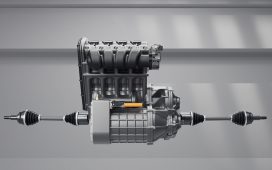TWO popular EVs have been recalled over a “fire risk” due to a serious battery fault.
A pair of major manufacturers came together to urge drivers to get their cars checked as they could burst into flames.
Porsche and Audi, which are both owned by the VW Group, warned customers that some of their models have a serious issue which could put them in danger.
In independent recalls, the sister companies announced that a select number of cars in Porsche’s Taycan range and Audi’s E-Tron lineup are at risk.
This was put down to a sealant-related issue on the battery, allowing water into it over time.
In separate statements, both said: “Under certain circumstances, there is a possibility that over time liquid can intrude into the high voltage battery.”


According to the manufacturers, this may trigger a yellow warning icon on the “instrument cluster”, changing to red if it is not addressed.
Should any significant amount of fluid enter the battery, this could lead to a fire.
Most current EV batteries are made using large amounts of lithium.
The light metal element is extremely reactive with water and can produce explosions or fires when the two come into contact.
EV fires are notoriously destructive and hard to put out as, given the elements involved, water cannot be used to extinguish them.
Last week, a blaze ripped through five cars in the car park of Sydney Airport after reportedly being started by a faulty battery.
Photos from the scene show twisted metal and scorched bodywork, while broken glass litters the ground.
And last month, 2700 cars on a cargo ship were melted after a suspected EV fire caused millions in damage.
A full list of the model variants affected by the recall can be found below.
The recall comes into effect on October 31, with customers asked to take their car to an authorised dealer to be tested.
If a leak is found, the battery pack will be replaced with a new one sealed with a different material.
It is illegal for dealers to sell any car while a recall is open on it.
A Porsche spokesperson said: “The safety of our customers and the quality of our vehicles is our top priority.
“After thorough review, we’ve determined that, in a small number of cases, there is a chance of moisture entering the car’s battery pack.
“If this occurs, the driver will be alerted first via a yellow caution light, followed by a red warning symbol in the car’s display.
“As a result, and through an abundance of caution, we are planning to recall the affected cars, built between September 22nd, 2022 and August 3rd 2023, to test the battery seal.”
They added that they have yet to receive any reports of fires relating to this issue.
Audi has been contacted for comment.


It comes after the boss of a major car company admitted a significant “challenge” with his own brand’s EVs.
Meanwhile, an EV owner explained why he made the switch back to petrol, saying it is better and cheaper.
Full list of models affected by the recall starting October 31
- 2023 Porsche Taycan built between September 23, 2022, and August 3, 2023.
- 2023 Porsche Taycan 4S built between September 22, 2022, and July 27, 2023.
- 2023 Porsche Taycan GTS built between September 24, 2022, and July 21, 2023.
- 2023 Porsche Taycan Turbo built between November 18, 2022, and May 10, 2023.
- 2023 Porsche Taycan Turbo S built between September 23, 2022, and May 9, 2023.
- 2023 Porsche Taycan 4 Cross Turismo built between September 27, 2022, and July 21, 2023.
- 2023 Porsche Taycan 4S Cross Turismo built between September 28, 2022, and July 21, 2023.
- 2023 Porsche Taycan GTS Sport Turismo built between October 5, 2022, and August 3, 2023.
- 2023 Porsche Taycan Turbo Cross Turismo built between October 13, 2022, and May 10, 2023.
- 2023 Porsche Taycan Turbo S Cross Turismo built between October 10, 2022, and August 2, 2023.
- 2023 Audi E-Tron GT built between September 26, 2022, and August 25, 2023.
- 2023 Audi RS E-Tron GT built between September 22, 2022, and August 28, 2023.












